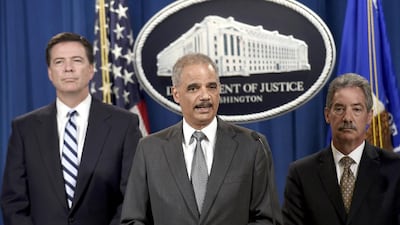BNP Paribas handled more than US$586 million of transactions with a Dubai-based corporation controlled by Iran, according to US court filings.
The disclosure came as the bank agreed to pay a record $8.97 billion in fines after pleading guilty to a series of sanctions violations involving entities in Sudan, Iran and Cuba over an eight-year period,
The French bank, the fourth largest in the world, pleaded guilty to processing more than $8.8bn through the US financial system on behalf of Sudanese, Iranian and Cuban entities subject to US sanctions from 2004-12, and to falsifying business records.
As part of the settlement agreement, the bank will be barred from US dollar-clearing operations for one year for its oil and gas commodity finance business, starting from next January. In addition, 13 executives including its group chief operating officer, will be required to leave the bank.
“BNP Paribas went to elaborate lengths to conceal prohibited transactions, cover its tracks, and deceive US authorities,” said the US attorney general Eric Holder in a statement issued late on Monday.
“These actions represent a serious breach of US law,” he added. “Sanctions are a key tool in protecting US national security interests, but they only work if they are strictly enforced. If sanctions are to have teeth, violations must be punished.”
Jean-Laurent Bonnafe, the BNP Paribas chief executive, issued a repentant response. “We deeply regret the past misconduct that led to this settlement,” he said. “We have announced today a comprehensive plan to strengthen our internal controls and processes, in ongoing close coordination with the US authorities and our home regulator to ensure that we do not fall below the high standards of responsible conduct we expect from everyone associated with BNP Paribas.”
The bulk of the bank’s transactions with Iranian entities were processed via an unidentified Dubai-based corporation that was under Iranian control, according to court documents.
“[BNP Paribas] processed payments on behalf of a client registered as a corporation in Dubai … but controlled by an energy group in Iran, in connection with three letters of credit that facilitated the provision of liquefied petroleum gas to an entity in Iraq,” the filings read.
“[The bank’s] ‘know your customer’ documentation on the Iranian Controlled Company showed that it was owned by the Iranian energy group, which was in turn owned by an Iranian citizen.”
The transactions began at a time when certain US dollar transactions were permitted by the US under the so-called U-turn exemption, which was eventually revoked in 2008. BNPP continued transacting with the entity until 2012, despite agreeing to commence an internal investigation into its compliance with US sanctions and cooperate fully with New York state and US authorities in 2010.
BNP also processed about $100.5 million in US dollar payments involving an Iranian oil company following the revocation of the U-turn exemption. The payments were in connection with six letters of credit issued by BNPP that financed Iranian petroleum and oil exports.
The majority of BNP’s illegal transactions were made on behalf of sanctioned entities in Sudan, according to court filings.
The bank processed about $6.4bn through the US on behalf of Sudanese-sanctioned entities from July 2006 through June 2007, including approximately $4bn on behalf of a financial institution owned by the government of Sudan.
jeverington@thenational.ae
Follow us on Twitter @Ind_Insights

